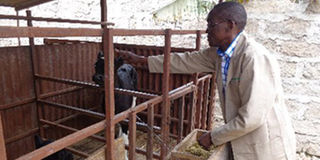Mattresses, smartphones make my cows give more

Placido Njeru feeds a calf in his farm, Genesis Dairy Farm in Njiru. PHOTO | BRIAN OKINDA | NATION MEDIA GROUP
What you need to know:
- With the Sh150,000 he had saved from his pig venture, Njeru bought one Friesian cow and two calves and built a simple wooden shed in his one-and-a-quarter acre piece of land.
- His dairy cow venture now boosts 20 cows, all accommodated in modern concrete sheds.
- According to Joshua Waweru, a livestock expert and veterinary officer from the Procurement Technical and Agricultural Centre (PTAC), it is important to keep the breeding and health records of your livestock.
- He also packages the dried manure in 90kg sacks and delivers it to interested farmers.
The cows are unperturbed by our unheralded entry and continue chewing in the comfort of their “mattresses” as Placido Njeru takes us on a tour of his farm. Located in the relatively dry Njiru neighbourhood in Ruai, Genesis Farm, is teeming with activity.
Njeru, the proprietor, moved to Nairobi from Tharaka Nithi, 25 years ago and settled in Njiru where he started rearing pigs.
“Later on I realised that pigs weren’t as profitable as I would have wanted,” says Njiru. “There was a sudden upsurge in the number of pig farmers in the area, creating fierce competition for the few customers we had.”
So in June 2006, after consultations with friends and family members, Njeru decided to venture into dairy farming.
With the Sh150,000 he had saved from his pig venture, he bought one Friesian cow and two calves and built a simple wooden shed in his one-and-a-quarter acre piece of land.
“Starting such an undertaking isn’t always easy. Despite all the developments one sees now, it all started with a simple shed made of wood and old iron sheets,” says the soft spoken farming entrepreneur.
His hard work and a never-say-die attitude enabled him to purchase three other dairy cows a few years later.
The business now boosts 20 cows, all accommodated in modern concrete sheds.
Apart from the three cows that he bought later on, the rest of the herd are descendants of the initial cows.
“One of the two calves is still here,” he says, pointing to a milker lying on a cow mattress in the shed, chewing cud.
The 10 lactating cows in the farm are milked twice daily, with the highest milk producer averaging 25 litres.
“We get about 200 litres of milk every day, and supply it to a milk ATM in Ruai and sell the rest to customers who make orders,” he says.
TOTAL MIX RATION
“After each of the two milking sessions, we feed the cows on TMR (Total Mix Ration) consisting of hay, molasses, dairy meal, minerals, legumes and salt lick,” he says.
The farm’s four heifers, two of which are nearing calving age, are fed on a special salt lick, hay legumes and minerals, while the six calves are given a mixture of weaners’ pallets, hay and minerals in addition to milk.
According to Joshua Waweru, a livestock expert and veterinary officer from the Procurement Technical and Agricultural Centre (PTAC), it is important to keep the breeding and health records of your livestock.
“The breeding records help the farmer to identify what qualities he wouldn’t wish to have in his flock and thus avoid the breeds that have that quality,” he says.
“Ensure you buy the pedigree breeds, from flocks that are not flawed, which is why health records are important to help you to understand the history of the dairy cow you want to buy,”
Waweru reiterates that for optimum returns, the farmers should ensure that 60 percent of their effort go to the proper care and comfort of the livestock, while the rest goes to their breeding.
“Other necessities, such as deworming, vaccination and proper diet feeding are essential,” he adds
Luckily, Njeru’s record keeping has been simplified by an application that runs on both Windows operated computers and smartphones, which contain fed-in records of all his cows individually, giving him the data he requires about any particular cow at any time.
It keeps track of all the activities the individual animal goes through in its lifetime in the farm.
The waste from the cow sheds is channelled to an underground digester from where the farmer makes biogas which he uses in cooking within his home.
From the digester, what is left is dried and used in his small kitchen garden where he grows vegetables and fruits using a small-scale drip irrigation kit.
He also packages the dried manure in 90kg sacks and delivers it to interested farmers. He takes some to another of his farms in Timau too where he grows crops for making fodder.
VALUE ADDITION
The entrepreneur is also venturing into value addition. The farm’s manager, Esther Wanjiku, runs the small scale yoghurt manufacturing project in the farm.
“Usually all the milk isn’t sold and what remains is used to make yoghurt which we sell to shops and the small restaurants in the neighbourhood,” says Wanjiku, adding that they make 20 litres of yoghurt each day and sell it at Sh150 per litre.
“This mode of farming is effective in controlling diseases and pests while it makes it easy to maintain the record keeping of the livestock as each of my cows is always at my sight,”
Each month, he makes an average of Sh210,000 from the activities he undertakes in the farm.





